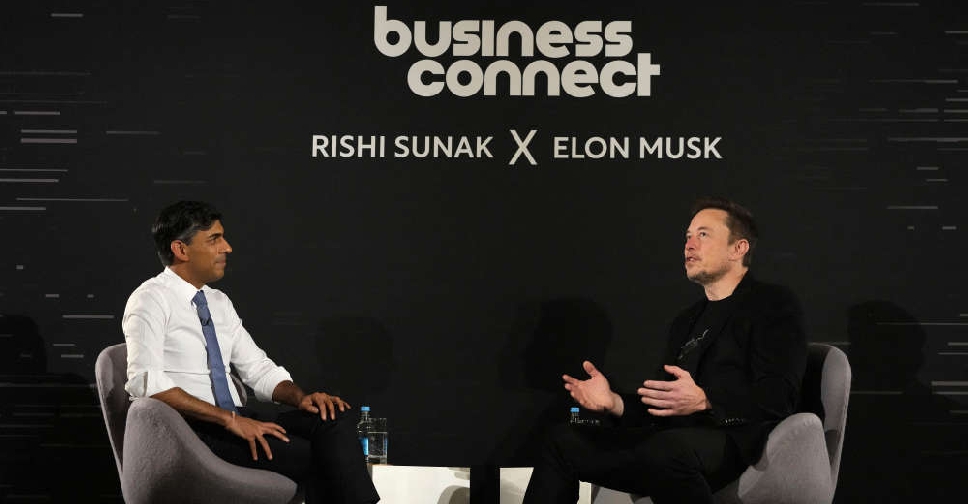
Leading AI developers agreed to work with governments to test new frontier models before they are released to help manage the technology's risks, in a "landmark achievement" during the UK's AI summit.
Some tech and political leaders have warned that AI poses huge risks if not controlled, ranging from eroding consumer privacy to causing a global catastrophe, and these concerns have sparked a race by governments and institutions to design safeguards and regulation.
At an inaugural AI Safety Summit at Bletchley Park, home of Britain's World War Two code-breakers, political leaders from the United States, European Union and China agreed on Wednesday to share a common approach to identifying risks and ways to mitigate them.
British Prime Minister Rishi Sunak said that declaration, the action on testing and a pledge to set up an international panel on risk would "tip the balance in favour of humanity".
He said the United States, EU and other "like-minded" countries had reached a "landmark agreement" with select companies working at AI's cutting edge on the principle that models should be rigorously assessed before and after they are deployed.
Yoshua Bengio, recognised as a Godfather of AI, will help deliver a "State of the Science" report to build a shared understanding of the capabilities and risks ahead.
"Until now the only people testing the safety of new AI models have been the very companies developing it," Sunak said. "We shouldn't rely on them to mark their own homework, as many of them agree."
THE WAY FORWARD
The summit brought together around 100 politicians, academics and tech executives to plot a way forward for a technology that could transform the way companies, societies and economies operate, with some hoping to establish an independent body to provide global oversight.
In a first for Western efforts to manage AI's safe development, a Chinese vice minister joined other political leaders on Wednesday at the summit focused on highly capable general-purpose models called "frontier AI".
Wu Zhaohui, China's vice minister of science and technology, signed a "Bletchley Declaration" on Wednesday but China was not present on Thursday and did not put its name to the agreement on testing.
Sunak had been criticised by some lawmakers in his own party for inviting China, after many Western governments reduced their technological cooperation with Beijing, but Sunak said any effort on AI safety had to include its leading players.
He also said it showed the role Britain could play in bringing together the three big economic blocs of the United States, China and the European Union.
"It wasn't an easy decision to invite China, and lots of people criticised me for it, but I think it was the right long-term decision," Sunak said at a press conference.
Microsoft-backed OpenAI, Anthropic, Google DeepMind, Microsoft, Meta and xAI attended sessions at the summit on Thursday, alongside leaders including European Commission President Ursula von der Leyen, US Vice President Kamala Harris and UN Secretary-General António Guterres.
Von der Leyen said complex algorithms could never be exhaustively tested, so "above all else, we must make sure that developers act swiftly when problems occur, both before and after their models are put on the market".
Entrepreneur Elon Musk told fellow attendees on Wednesday that governments should not rush to roll out AI legislation, two sources said.
Instead, he suggested companies using the technology were better placed to uncover problems, and they could share their findings with lawmakers responsible for writing new laws.
The billionaire had the final words on AI after the summit ended in a conversation with Sunak, broadcast later on Thursday on Musk's X, the platform previously known as Twitter.
"We live in the most interesting times," he said. "And I think this is 80 per cent likely to be good, and 20 per cent bad, and I think if we're cognisant and careful about the bad part, on balance actually it will be the future that we want."




 Nasdaq set to confirm bear market as Trump tariffs trigger recession fears
Nasdaq set to confirm bear market as Trump tariffs trigger recession fears
 Dana Gas and Crescent Petroleum exceed 500M boe in Khor Mor field
Dana Gas and Crescent Petroleum exceed 500M boe in Khor Mor field
 China to impose tariffs of 34% on all US goods
China to impose tariffs of 34% on all US goods
 Shares bruised, dollar crumbles as Trump tariffs stir recession fears
Shares bruised, dollar crumbles as Trump tariffs stir recession fears
 Wall Street futures sink as tariffs fuel recession fears
Wall Street futures sink as tariffs fuel recession fears



